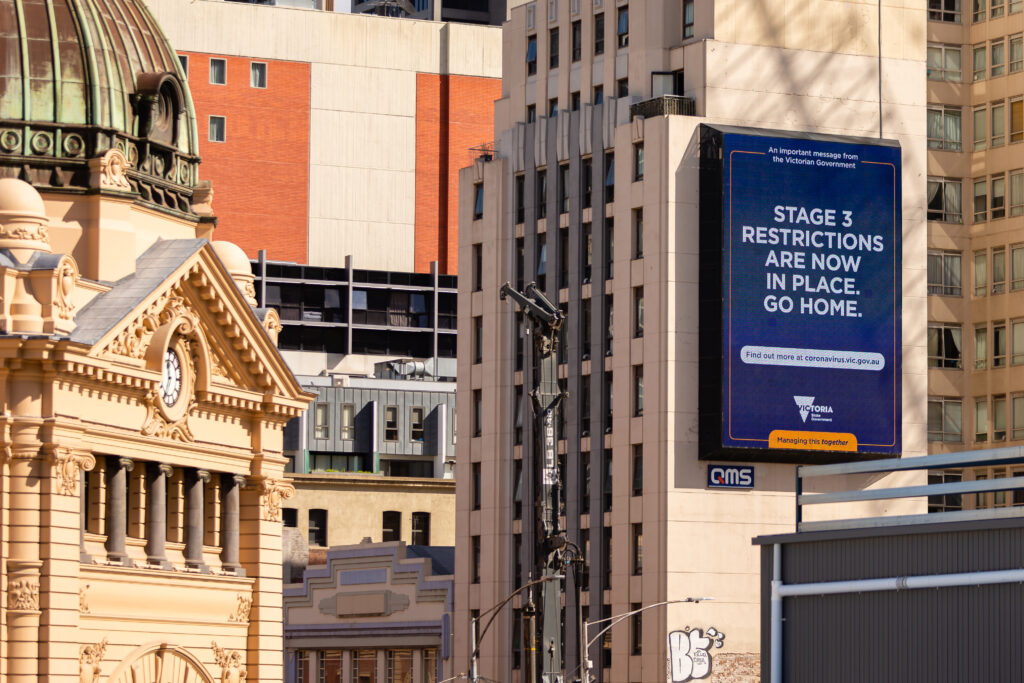Dr Zoe Leviston and Professor Iain Walker investigate how well Australians really adhered to COVID-19 directives, and what it reveals about human perception and misconception.
Australia’s initial response to the coronavirus disease 2019 (COVID-19) pandemic, including swift border controls and a raft of restrictions on social movement, has been praised internationally.
The bipartisan domestic narrative emphasised unity: we are all in this together, and we’ll all get through this together. Beneath the surface, though, another message was stirring: we are all of us making the hard sacrifices needed … except for those returning Aspen skiers, and those health care workers supposedly having illegal dinner parties, and those wedding-goers in Sydney, and …
The media spotlighted these alleged breaches of public health directions, sometimes to comedic effect. Would people be fined, as was the case in New South Wales, for going for a run and having a kebab?, one Premier was asked. A spin on another Premier’s press conference take-down of transgressors (pubs shutting “doesn’t mean you can have all your mates around to home and get on the beers”) wound up in 12th spot on Triple J’s Hottest 100. In time, of course, more serious, more potent, and prominent public pushbacks against lockdowns and other COVID-19 measures would emerge.

As researchers in social psychology, we explored how two competing messages — one of near universal adherence to public health directions, the other of continued breaches — might be shaping Australians’ social perceptions of compliance with restrictions. Did we view our fellow community members with fondness and appreciation for their sacrifices, or with suspicion and disapproval at their (real or imagined) transgressions?
From August to September 2020, we conducted a national survey of almost 1700 people, measuring participants’ self-reported compliance with COVID-19 directives in their state or territory and their perceptions of others’ compliance. Overwhelmingly, and across all states and territories, people reported complying with restrictions. This squared nicely with the narrative from government and health leaders that we were “doing the right thing”.
But more than 80% of participants rated their own compliance as higher than the people around them, and by an average of nearly 30 scale points (out of 100). Doubtless, many participants had good insight into how their own behaviour compared with others. The same claim cannot be maintained at an aggregate level. It is just not possible that 80% of respondents complied more than those around them.
This discrepancy between how one’s own behaviour compared with others suggests the narrative of COVID-19 transgressions was gaining traction. This is consistent with other well known social psychological processes.
First, the discrepancy reflects a well known and pervasive cognitive bias called the better-than-average effect: we tend to think we are better than most on most things, especially in relation to our peers. We are more moral and virtuous, more compassionate and understanding, and, of course, less biased than those around us.
We also have more insight into our own behaviour than we do into others’; we know intimately the impact actions such as staying home, only going out for essential purposes, and not seeing friends and loved ones has on our own lives. The line of sight on similar (or worse) impacts on others’ lives is more clouded.
From another angle, our results can be viewed as reflecting a faulty assumption, not about our own good behaviour, but about others’ bad behaviour. Or more specifically, a tendency to overestimate the prevalence of others’ bad behaviour. Such misperceptions are often the result of misleading informational cues in our environment. Media amplification of relatively rare occurrences is one such informational cue. It is important to note here that although our participants rated others’ compliance as lower than their own, they still thought that others complied at least “somewhat closely”. The perceived norm was still that most people complied, just not as much as we each thought we personally did. Possibly too, the norm of compliance was weakening because of the attention given to transgressions, and that’s a bad thing for public health officials wanting to encourage people to observe restrictions for the sake of the public’s health.
As well as being poor at estimating the prevalence of bad behaviour, we are also sensitive to those who contravene social norms, more so than we are to those complying. We can walk past 14 people in a supermarket each wearing a mask and it fails to make an impression; if the 15th person is maskless, we tend to take note. Intriguingly, we are inclined to be more punitive to norm transgressors who are part of our own social group and more likely to remember instances that are rare.
To summarise, we easily recall both the hardships that come with our own compliance and the transgressions of those around us.
But do these inaccuracies in understanding our own and others’ behaviour matter? We suggest they do.
Perceptions about what other people are doing are important in shaping our own behaviour. Particularly in new and threatening situations, we look to what (we think) others are doing to determine the best course of action. When something novel and scary like the COVID-19 pandemic comes along, assumed norms are in a state of flux, but an inaccurate consensus about the behaviour of others can quickly be established. Underestimating others’ compliance is likely to reduce future compliance, as people adjust their behaviour based on their understanding of the group norms.
Moreover, misguided assumptions of widespread normative deviance risk demotivating efforts to comply.
Public health communicators, from doctors to politicians, have a crucial role to play here. Transgressions against public health directions should be acknowledged, dissuaded, but also put in their correct context: that they are remarkable due to their rarity. Moreover, the media’s overemphasis on relatively infrequent transgressions should be called out as misrepresenting the public’s response to health directives and as undermining the efforts and sacrifices of the broader community. It is also important to avoid demonising transgressors, which likely will also heighten tensions between social groups, and undermine a sense of “us-ness”.
While there’s always room for improvement, the initial health and government leadership response to COVID-19 was one Australia largely got right. We can also take lessons from elsewhere, including instances where “togetherness” was undermined by too quick an introduction of a “personal responsibility” mantra. Insights from cognitive and social psychology can also play a role in crafting public health messages that avoid unwittingly creating perverse outcomes in the community, thereby ending the public health challenge more quickly and ensuring we can all get on the beers safely, responsibly, and in moderation.
Dr Zoe Leviston is a social psychology researcher and Research Fellow at the Australian National University.
Professor Iain Walker is a social psychologist, with broad interests in social and environmental sustainability and in social justice. He is Director of Melbourne University’s Melbourne Centre for Behaviour Change.
The statements or opinions expressed in this article reflect the views of the authors and do not necessarily represent the official policy of the AMA, the MJA or InSight+ unless so stated.
Subscribe to the free InSight+ weekly newsletter here. It is available to all readers, not just registered medical practitioners.
If you would like to submit an article for consideration, send a Word version to mjainsight-editor@ampco.com.au.

 more_vert
more_vert